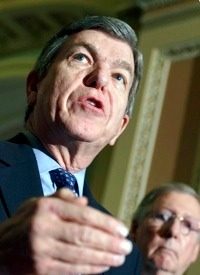
The amendment, offered by Senator Roy Blunt (R-Mo.; left), would have protected the “religious beliefs and moral convictions” of both those offering and purchasing health insurance under ObamaCare socialized medicine law passed by Congress in 2010.
The Obama Administration announced January 20 that it had rejected an appeal from non-church-related religious institutions that had asked for a waiver allowing them, like churches, to forgo the mandate on grounds that it violated their moral and Christian convictions.
When pro-family and religious organizations, led by the U.S. Conference of Catholic Bishops, vocally and aggressively vowed to fight the mandate, the Administration responded with what it said was a “revision,” under which religious institutions supposedly would not be required to offer free contraceptives to women employees. Instead, promised the Administration, the requirement would be totally shifted to their insurance providers — a compromise that opponents of the mandate scorned as a distinction without a difference.
The Blunt amendment would have overridden the President’s mandate and ensured that no employer or insurance provider would be required to go against their convictions.
While the 51-48 defeat of the measure was expected because of the Senate’s Democrat majority, three Democratic Senators did cast their votes in favor of the pro-life amendment: Bob Casey of Pennsylvania, Joe Manchin of West Virginia, and Ben Nelson of Nebraska.
By contrast , Republican Senator Olympia Snowe of Maine was the lone Republican crossing over to vote to table (kill) the amendment, justifying her actions by claiming the amendment was “ much broader than I could support.” She added that “I think we should focus on the issue of contraceptives and whether or not it should be included in a health insurance plan, and what requirements there should be.”
Before the vote, Senator Orrin Hatch (R-Utah) spoke in favor of the amendment, pointing out that “our Constitution demands that those individuals and institutions that object to providing these services on religious and moral grounds be protected.” He added that “under this Administration, our Bill of Rights has been subordinated to President Obama’s desire to micromanage the nation’s health care system.”
Health and Human Services Secretary Kathleen Sebelius urged senators to reject the amendment, calling it “dangerous and wrong.” She claimed that the measure “isn’t limited to contraception nor is it limited to any preventative service. Any employer could restrict access to any service they say they object to.”
But during floor debate Senator Blunt emphasized that most federal health programs give place to the religious beliefs and moral convictions of individuals and groups affected. “There is no health care law since 1973 that doesn’t have [the] provisions in this [amendment],” he said.
Cecile Richards of Planned Parenthood, the nation’s premier abortion provider and one of the financial beneficiaries of the Obama mandate, reflected the delight of pro-abortion groups over the amendment’s defeat, calling it an “important victory” for participants in the contraception/abortion industry. “Today’s vote says that your boss won’t be able to decide which prescriptions you can get filled and which medical procedures you can have,” Richards told her group’s customers in a prepared statement.
While not surprised by the defeat of the Blunt amendment, supporters nonetheless expressed their disappointment. Matt Bowman of the Alliance Defense Fund noted that the amendment “was a necessary measure to begin to restore the religious liberties of Americans that ObamaCare has trampled on with its assumption of unlimited bureaucratic power. Every vote for religious freedom should be unanimous, but tragically, our fundamental freedoms didn’t seem to matter to enough senators.”
Similarly, Jay Sekulow of the American Center for Law and Justice said that the Senate “missed an important opportunity to act on behalf of millions of Americans who understand that the HHS regulation violates religious liberty and their conscience rights.”
Dr. Richard Land of the Southern Baptist Convention’s Ethics and Religious Liberty Commission, said he was “outraged” by the vote. “If the government can tell its citizens that their First Amendment guarantee of religious freedom and conscience is subject to its dictates, then the First Amendment offers no protection to people of faith,” he said in a statement.
“Make no mistake,” he added, “the Senate vote was not about contraception, but about the right of people of faith to be able to live out the values of their faith free from government coercion.” Land vowed that his and other religious groups would continue “to press this battle for freedom to the very end. We call on all people who love liberty to join us in this must-win struggle against government tyranny.”
In its coverage LifeSiteNews.com listed the 13 Catholic Senators who voted against their church in tabling the amendment. Matt Smith, president of the pro-life Catholic Advocate, said that by “consenting to the disastrous HHS mandate, the U.S. Senate has taken the unprecedented step to deny our religious liberties instead of defending the Constitution. It is disappointing to witness a group of senators misled on this issue at the expense of one of our key founding principles.”
Before the vote, Senator Hatch expressed the view of many religious and moral Americans, declaring that even though the amendment was doomed, the fight against the mandate would continue. “I am putting the administration on notice,” he said from the floor of the Senate. “I am not done with you. My colleagues are not done with you … you are going to be held to account for your actions.”
Photo of Sen. Roy Blunt: AP Images



